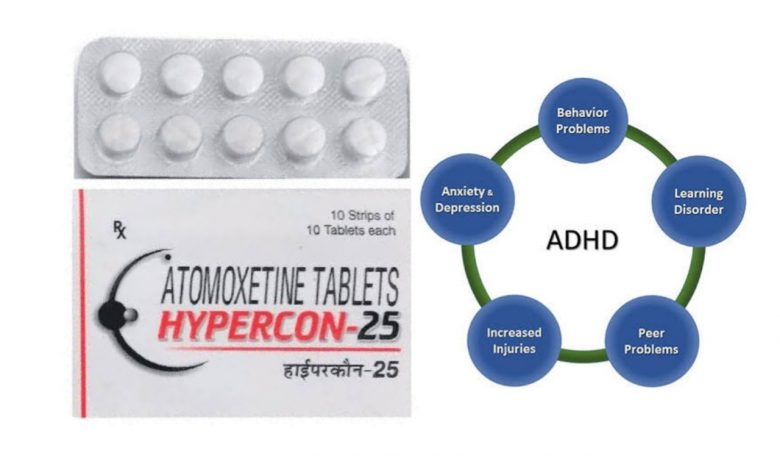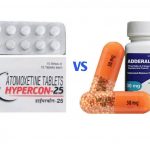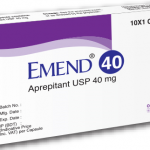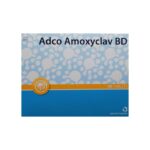Hypercon: Uses, How it Works, Dosage, Side Effects, Interactions

What is Hypercon?
Hypercon is a brand of atomoxetine, also sold under the brand name Strattera, among others, Hypercon is a medication used to treat attention deficit hyperactivity disorder. It is used as part of a total treatment program to increase the ability to pay attention and decrease impulsiveness and hyperactivity in children and adults with ADHD.
Hypercon is in a class of medications called selective norepinephrine reuptake inhibitors. It works by increasing the levels of norepinephrine, a natural substance in the brain that is needed to control behavior.
Hypercon may be used alone or along with psychostimulants. Use of Hypercon is only recommended for those who are at least six years old.
How should Hypercon be used?
Hypercon comes as a tablet to take by mouth. It is usually taken either once a day in the morning, or twice a day in the morning and late afternoon or early evening. Hypercon may be taken with or without food. Take Hypercon at around the same time(s) every day.
Follow the directions on your prescription label carefully, and ask your doctor or pharmacist to explain any part you do not understand. Take Hypercon exactly as directed. Do not take more or less of it or take it more often than prescribed by your doctor.
Swallow Hypercon capsules whole; do not open, chew, or crush them. If a capsule is accidentally broken or opened, wash away the loose powder with water right away. Try not to touch the powder and be especially careful not to get the powder in your eyes. If you do get powder in your eyes, rinse them with water right away and call your doctor.
Your doctor will probably start you on a low dose of Hypercon and increase your dose after at least 3 days. Your doctor may increase your dose again after 2–4 weeks. You may notice an improvement in your symptoms during the first week of your treatment, but it may take up to one month for you to feel the full benefit of Hypercon.
Hypercon may help to control the symptoms of ADHD but will not cure the condition. Continue to take Hypercon even if you feel well. Do not stop taking Hypercon without talking to your doctor.
What side effects can Hypercon cause?
Hypercon may cause side effects. Tell your doctor if any of these symptoms are severe or do not go away:
- burning or tingling in the hands, arms, feet, or legs
- constipation
- decreased sex drive or ability
- difficulty urinating
- dizziness
- dry mouth
- excessive tiredness
- gas
- headache
- heartburn
- hot flashes
- loss of appetite
- mood swings
- muscle pain
- nausea
- painful or irregular menstrual periods
- stomach pain
- sweating
- unusual dreams
- vomiting
- weight loss
Some side effects can be serious. If you experience any of the following symptoms, call your doctor immediately:
- abnormal thoughts
- chest pain
- dark urine
- difficulty swallowing or breathing
- dizziness or faintness
- erection that lasts for several hours or longer
- fast or pounding heartbeat
- flu-like symptoms
- hallucinating (seeing things or hearing voices that do not exist)
- hives
- hoarseness
- itchy skin
- pain in the upper right part of your stomach
- rash
- seizures
- shortness of breath
- slow or difficult speech
- swelling of the face, throat, tongue, lips, eyes, hands, feet, ankles, or lower legs
- weakness or numbness of an arm or leg
- yellowing of your skin or eyes
Hypercon may slow down children’s growth or weight gain. Your child’s doctor will probably monitor your child carefully during his or her treatment with Hypercon. Talk to your child’s doctor about the risks of giving this medication to your child.
Hypercon may cause other side effects. Call your doctor if you have any unusual problems while taking this medication.
Hypercon Safety Information
Studies have shown that children and teenagers with attention-deficit hyperactivity disorder (ADHD; more difficulty focusing, controlling actions, and remaining still or quiet than other people who are the same age) who take Hypercon are more likely to think about killing themselves than children and teenagers with ADHD who do not take Hypercon.
While your child is taking Hypercon, you should watch his or her behavior very carefully, especially at the beginning of treatment and any time his or her dose is increased or decreased. Your child may develop serious symptoms very suddenly, so it is important to pay attention to his or her behavior every day. Ask other people who spend a lot of time with your child, such as brothers, sisters, and teachers to tell you if they notice changes in your child’s behavior. Call your child’s doctor right away if your child experiences any of these symptoms: acting more subdued or withdrawn than usual; feeling helpless, hopeless, or worthless; new or worsening depression; thinking or talking about harming or killing him- or herself or planning or trying to do so; extreme worry; agitation; panic attacks; difficulty falling asleep or staying asleep; irritability; aggressive or violent behavior; acting without thinking; extreme increase in activity or talking; frenzied, abnormal excitement; or any other sudden or unusual changes in behavior.
Your child’s doctor will want to see your child often while he or she is taking Hypercon, especially at the beginning of his or her treatment. Your child’s doctor may also want to speak with you or your child by telephone from time to time. Be sure that your child keeps all appointments for office visits or telephone conversations with his or her doctor.
Your doctor or pharmacist will give you the manufacturer’s patient information sheet (Medication Guide) when you begin treatment with Hypercon and each time you refill your prescription. Read the information carefully and ask your doctor or pharmacist if you have any questions. You can also visit the Food and Drug Administration (FDA) website (http://www.fda.gov/Drugs) or the manufacturer’s website to obtain the Medication Guide.
Talk to your doctor about the risks of giving Hypercon to your child, of using other treatments for your child’s condition, and of not treating your child’s condition.





